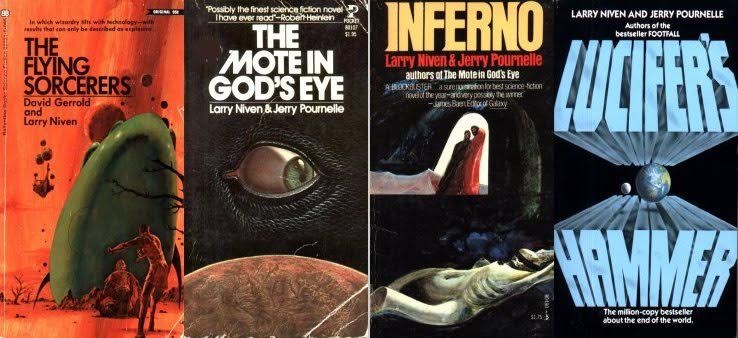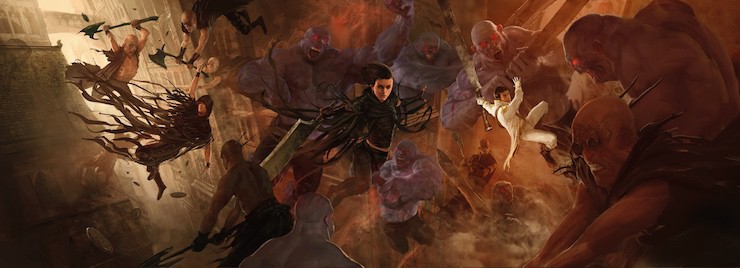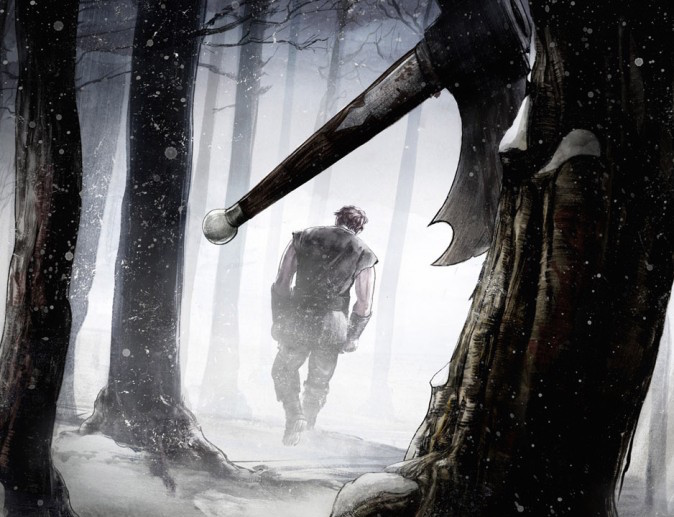There was no triggering event, but I knew that I couldn’t read The Wheel of Time anymore. Or any epic fantasy stories. This was a literary genre that had defined my entire life but here I was, only 27 years old, well before I started working at Tor, and I felt like the victim of a long con. A sucker who kept buying books that promised a resolution that would never arrive.
2008 was a bad year for epic fantasy in general. Robert Jordan had just passed away, far too early, and while Brandon Sanderson had been named the successor to The Wheel of Time, at that point readers had no way of knowing what that would mean. Patrick Rothfuss’ The Name of the Wind had recently promised a stunningly intimate new world, but it was only just beginning as a series. Harry Potter’s adventures had just concluded. And the latest Song of Ice and Fire book A Feast For Crows was nearing its third birthday, with A Dance With Dragons still several horizons away. Epic fantasy felt abandoned as a genre. And if its creators couldn’t be bothered to keep it alive, why should I, as a reader?
2008 was also a bad year for me. I was struggling to find secure footing in New York City, even though at that point I had been living here for over two years. I drifted from unemployment to menial entry-level jobs and back again. Too poor to afford regular internet access or train fare, I found myself cut off from my family. I watched from a distance as they dissolved. Only two years later my brother, me, and some photo albums would be all that was left. I still have dreams where we’re all together in the house I grew up in. Still.
I grew up in that house reading and watching and playing and pretending and CONSUMING science fiction and fantasy. My identity was determined by genre at a very early age. When I was 11 years old I became so enamored by The Legend of Zelda that I defied my parents’ ban on video games by raising $30 through doing chores, bought the electronic guts of an 8-bit Nintendo from a kid in the neighborhood, then reassembled those guts into a working system. I can’t have a Nintendo, Mom and Dad? Too late, I made one and I would really like Zelda for Christmas, please!
I imagine by that point it had become clear to my parents what kind of monster they had created. My mother was a gentle, supportive, and hilarious person who made this world feel like the best thing orbiting the Sun, while my father left piles of tattered SFF paperbacks under every lamp, on every sun-baked car dashboard, and every greasy workbench. I still associate the sharply tanged smell of rust with Larry Niven and Jerry Pournelle’s books. How was I expected not to want to explore this world and ALL worlds in this kind of environment? My parents wisely relented on their ban of video games. (And even got me an SNES that Christmas.)

I have always been bursting with the desire to explore, to DO something, but in 2008 I was stymied by a lack of basic structure in my life; structure provided by relationships, family, and employment that we often take for granted. I would spend a few days focused on job applications, but nothing would result, and that frustrated energy would go into writing fiction. Then I would lose focus on the fiction, and again nothing would resolve, and that shaky energy would get poured into playing Nintendo all through the night. This behavior was cyclical and it drove me and my partner at the time insane. Over time, frustrated expectations develop into depression, and depression is corrosive. It erodes your perspective, your self-esteem, and subverts the time of those who truly care about you.
Not being able to affect the world around me, even through simple interactions, made me angry as well. I wasn’t accustomed to being sidelined in such a manner. I had a lot of energy, a lot of IDEAS, and I was wriggling all over the place, trying to find some crack in the pavement where I could push through. Fiction in the form of books, television, movies, and video games became incredibly important to me during this period. They were often the only things in my life that offered access and, most importantly, that offered resolution. I could make Mario leap and spin as many times through Bowser’s Castle as I needed to until the Koopa King was defeated and the quest was over. I could watch Batman triumph over Heath Ledger’s Joker. (And Heath Ledger’s Joker triumph over our more insipid social constructs, because when you’re down that kind of nihilism feels glorious even through it is monstrous.)
Epic fantasy offered no such access or resolution, and it hadn’t done so in a significant manner since 2005, when both Knife of Dreams and A Feast For Crows came out. In hindsight, 2008 was simply a lull in epic fantasy publishing, but my perspective at the time was not so generously wide. I could, at best, be described as a pair of glowing eyes hovering in the dark mouth of a cave. The Wheel of Time, A Song of Ice and Fire…their absence was a betrayal, sharp and deep.
Ironically, late 2007 and early 2008 is also when the last TV writer’s strike occurred, leaving a production gap in distraction-heavy television that was several months large. The effect of the strike was largely contextual. I had nothing to pay attention to on TV, and no money to go seeking out new video games, so my focus fell more heavily onto books.

From deep within my cave the subsequent announcements about the progress of The Wheel of Time took on a cynical edge. The final book would be released in November 2009, they said. But then Brandon said he needed to reread the series before he could even start writing it. Then he changed the target word rate to 250,000 words, then 400,000 words. Then it wasn’t coming out in 2009 at all. Then it wasn’t going to be one book, but three. And they were ditching Jordan’s title and calling the last book Tarmon Gai’don. And so on and so on. Although Tor and Sanderson were attempting to be communicative and clear in a way that had never before been attempted with the series, I just felt like I was being toyed with. The Wheel of Time series was already famous for avoiding resolutions. How was it that Jordan’s absence was somehow magnifying that aspect of the series?
So…fuck it. I wasn’t going to read this series anymore. Or any epic fantasy anymore. I wasn’t going to support this type of behavior. I hadn’t read a word of it since 2005 anyway, and now it was 2009 and my life was completely different and horrible and A Dance With Dragons was obviously never coming out either and if I can’t explore this world or these fantasy worlds then fuck it. Fuck all of it.
The World Demands More
Pacing is a constant source of tension within epic fantasy, and mastering it is one of the most difficult lessons to learn for those who create it. In epic stories, the world is essentially its own character, thus the more detail that is brought into a fantasy world, the more that it develops its own characteristics. One of the most joyous moments a fiction writer can experience is when a character starts telling the writer how they’d react to a forthcoming plot development. The excitement an author feels over being able to craft this kind of independence and life makes it easy to overlook that the world that these characters inhabit is a character in itself and thus will also develop its own independence.
Worlds have their own momentum, and that fierce speed can overwhelm the day-to-day life of an author. A Song of Ice and Fire will most likely complete itself, separate from its creator, a circumstance fantasy readers would never have foreseen only 5 years ago. Brandon Sanderson’s Cosmere only seems to make its author faster, to the point where he’s delivering two books when his publisher was only expecting one. Worlds can be terrifying creatures, affecting us all differently.
Robert Jordan very visibly struggled with the momentum of his fantasy world. The Wheel of Time contains a variety of eyebrow-raising structural decisions, some of them genius, and some of them puzzling. The middle portion of the series, books 7 through 10 I’d argue, are riddled with what is known these days as “bloat”: An overly intense focus on secondary or tertiary characters at the expense of the main characters. Bloat becomes a bigger and bigger issue as a fantasy series continues onward, as background characters prove too vibrant to ignore, or a situation arises that can’t be solved via a simple battle. Bloat is not a purposeful choice that the author makes. Bloat is a demand that a fantasy world makes of its creator, and is always supported by the momentum of that world. Bloat is an author attempting to mollify his world and his readers at once.
Jordan’s own negotiations with The Wheel of Time begin in A Crown of Swords, as the reader can see in the sheer number of plotlines that the main character Rand al’Thor, must deal with. Suddenly, Rand must:
- Solidify his rule of the nation of Cairhien.
- Support Elayne’s accession to the crown in the neighboring nation of Andor.
- Deal with the Aes Sedai who captured him.
- Figure out how to interact with the Rebel Tower.
- Make sure the Black Tower isn’t going crazy.
- Stop Cadsuane from driving him crazy.
- Stop his own magic power from driving him crazy.
- Figure out how he feels about Min, Aviendha, and Elayne.
- Figure out the purpose of the Aiel people.
- Hunt down the Shaido.
- Figure out how to stop the endless summer from baking the planet.
- Oust Big Bad Sammael from Illian.
- Unite all the nations of Randland.
- And the Sea Folk.
- And decimate or make peace with the Seanchan.
- …oh, also Padan Fain is still lurking about ready to get slashy-slashy.
This is all in just Rand’s storyline; never mind that we as readers also expected to spend time with Perrin, Mat, Egwene, and Nynaeve. Seven books in, the focus of Jordan’s Wheel of Time had turned incontrovertibly towards its world and away from its characters.
As a result, books seven through eleven: A Crown of Swords, The Path of Daggers, Winter’s Heart, Crossroads of Twilight, and Knife of Dreams, read like one long book. The narrative fractured more and more past A Crown of Swords and came very close to scuttling the entire series. The Path of Daggers and Winter’s Heart feel like one book split into two volumes, as does Crossroads of Twilight and Knife of Dreams. Crossroads of Twilight, despite its amazing title and focus on the growth of the series’ characters, famously stalled The Wheel of Time entirely, consisting entirely as it does of characters reacting to things that happened in the previous book and deciding to do awesome things…in the next book.
Robert Jordan and The Wheel of Time regained its footing with Knife of Dreams. Not only that, but Jordan’s skill as a writer took a noticeable jump. Major character Egwene al’Vere is only present in a single chapter of the book, but that chapter by itself is a masterful work, a “small story” that takes Egwene from the status of prisoner to de facto leader of a third of the White Tower in one unbroken narrative, a tour de force showcase of the strength of Egwene’s character, an entire novel in one chapter, summed up by a single sentence of quiet, overwhelming triumph: “There was honey in the tea!” Indeed.
From my perspective in late 2008 and early 2009, though, the strength of Jordan’s writing was years in the past, drowning a tempest of epic fantasy bloat that had somehow strengthened with his passing. The demands of the world Jordan had created were now so strong that it didn’t matter who was writing it, the Wheel of Time had separated from its creator, and was clearly insistent on extending its length forever onwards. And I no longer wanted to be party to that.
True Love Will Find You in the End
As the release date of The Gathering Storm approached, curiosity overcame my extreme cantankerousness and I checked Brandon Sanderson’s first Mistborn novel (known these days by the subtitle “The Final Empire”) out from the library. I had never heard of Sanderson before he was chosen to shepherd The Wheel of Time, and I was curious what kind of writer he was, but still grumpy enough about epic fantasy to go to the library instead of just buying a $7 mass market paperback that I might not like.
Mistborn is the complete opposite of The Wheel of Time and in its (only!) 400-or-so pages I found a response to my own frustrations regarding epic fantasy. The characters in Mistborn talk plainly to each other, they answer questions put to them…in short, they treat each other with a camaraderie and respect that at the time I found lacking in epic fantasy at large. There’s a chapter very early on where the main character in Mistborn, Kelsier, explains his entire plan to his co-conspirators. Where most fantasy relies on holding back key information in order to cultivate ongoing mysteries, Mistborn goes the opposite way, giving the reader so much information that it would take time to puzzle out all the myriad connections. Sure, Kelsier was trying to overthrow the evil Empire he lived within, but what else might he be up to?

This approach allowed Mistborn to generate a surprise as potent as the first time I experienced Ned Stark’s beheading: the utter failure of its epic fantasy storyline! About halfway through the book, the resistance, freed peoples, and citizen armies that Kelsier and company have been building are annihilated. They take no fields and no last-minute Rohirrim arrive to save them. The main focus of Kelsier’s plan falls apart completely, leaving the reader to wonder just what, if anything, will fill the second half of the book. Brandon Sanderson pulls the same trick again at the very end of the book, killing off both Kelsier and the untouchable and villainous Emperor. Mistborn tore through all of my most-hated fantasy tropes, and all of its plot, in a single book; I had to read the next book in the trilogy, if only to see what could possible happen next. This was the writer who was taking over The Wheel of Time? The Gathering Storm was going to…well, I didn’t know…but The Wheel of Time combined with Mistborn’s refreshing take on the epic fantasy at least promised something interesting.
The conclusion to The Wheel of Time is now in our rear-view and I may now be a bigger fan of it, and epic fantasy, than ever before. A large part of this is due to the stellar ending to the series itself, an ending which manages to refocus the narrative onto its main characters while keeping pace with the world that those characters are trying to piece back together. That The Wheel of Time came to a close in a truly epic fashion goes a long way towards redeeming any meanderings that came before it.
And, surprisingly, it also makes me miss those meanderings. The Gathering Storm, Towers of Midnight, and especially A Memory of Light all operate at breakneck speed. And while there is beauty and wonder to be found in the pages of those final three volumes, there is a subtlety that is missing. To me, that subtlety did not become particularly noticeable until it was gone. It is there if you reread the series. It is stamped upon the very DNA of its writing. It is the methodical, consistent, and flowering prose of Robert Jordan. Jordan writes worlds in slow bloom, but bright colors. His environments feel enormous and ornate. They feel solid, and old. A reader feels the weight of the history pushing The Wheel of Time forward. Jordan is a subtle but evocative artisan, and surprisingly emotional; just look at the titles to the books themselves: “Winter’s Heart” isn’t so much a description as it is a sensation. “The Fires of Heaven” is a grand statement, worthy of the size of the world it depicts. “A Memory of Light” is just beautiful, a four-word phrase that manages to signify the sad and hopeful end of an entire world all at once.
I had to step away from epic fantasy to see this. Or perhaps, I needed epic fantasy as a genre to step away from me in order to provide what I needed, and to grow into wonderful new directions.
I’ve since grown into wonderful new directions, myself. I started working at Tor, for one. I got married, started a new family, went back to school…created the structure I had lost. I’m looking forward to the next Song of Ice and Fire book, even though I feel full up on the series itself, and while I still feel the desire to explore, I don’t feel the need to explore only fantasy fiction. I’ve been locked into worlds before. And it’s no fun.
I can’t forget: There is always another world.
Chris Lough writes about fantasy and TV and running and things on the internet, and a lot here on Tor.com. (And sometimes on Twitter.)










